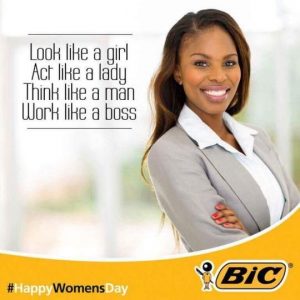Original Ad

This is an advertisement that Bic South Africa released in honour of Women’s Day. While Bic seems to be attempting to empower women, it does quite the opposite. They are implying that if you purchase their pens you will look like a girl, act like a lady, think like a man and work like a boss – which is the ideal powerful woman in the workplace (as indicated by the suit). What’s more is that they released this ad for Women’s Day, which is supposed to be celebrating womanhood and instead polices women suggesting that there is a very narrow type of woman that women should strive to be and who should be celebrated
Unfortunately every line in this ad is offensive. “Look like a girl” implies that women need to look young, so young that they should look like a child – infantilizing women even further within society. This line implies that a woman is valued for her (extremely) youthful looks. “Act like a lady” is a line that women have been fighting against for decades. This line implies that a woman must ‘know her place’, must be prim, proper and not speak her mind. “Think like a man” implies that women are not smart on their own accord. It implies that any man is smarter than the smartest woman so women must think like men in order to be successful. Traditionally this has meant that women must be less ’emotional’ in the work place, even though men who act the same way are considered ‘passionate. This is a stereotype women have worked to get away from since women entered the workforce. Lastly “Work like a Boss” suggests that women must work harder to get ahead, more than they already have to in a patriarchal society, as if women haven’t been working hard in and out of the home for centuries. Furthermore, these nouns seem to be ranked from worst to best as though appearances and girls are valued the least and handwork and bosses (traditionally male) are valued most.
*Note that Bic has since apologized twice for this ad.
